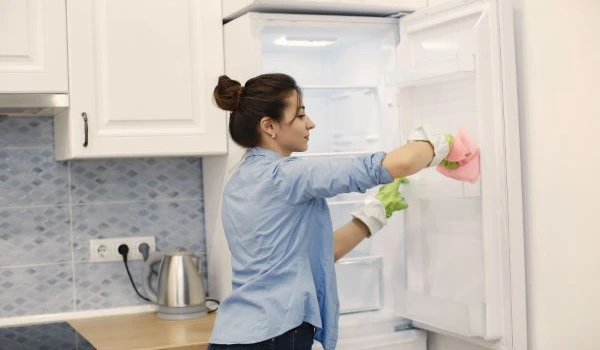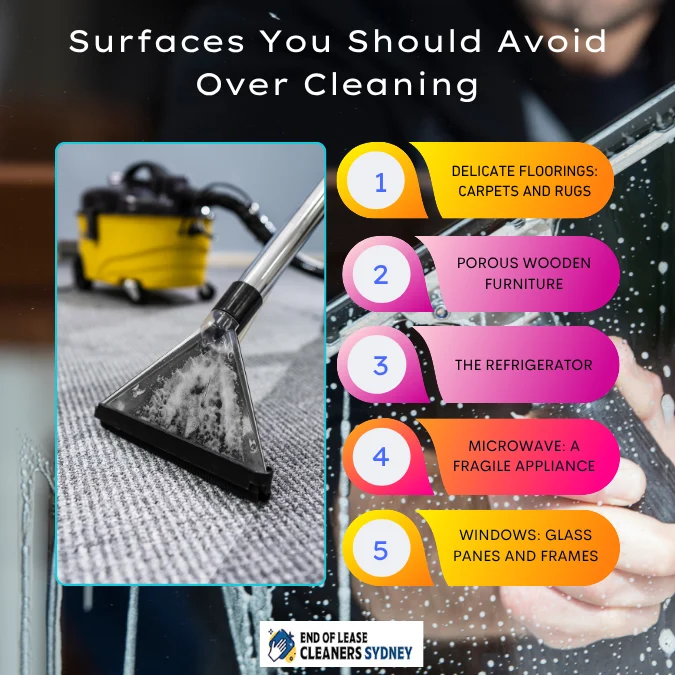Maintaining a clean and sterile house promotes a healthy, hygienic, and harmonious indoor environment. Regular dusting, vacuuming and scrubbing not only keep germs at bay but also improve your property value. But, sometimes, over cleaning certain surfaces can do more harm than good. This may come as a shock to many households, but cleaning too much can lead to permanent damages and costly repairs.
Of course, it is good to follow routine cleanliness and maintenance, but it's also imperative to consider the type of surface you are dealing with. Over cleaning delicate and porous surfaces may wear out the shine, cause discolouration or even weaken the material over time. This becomes even more crucial when handling a thorough end of lease cleaning Sydney job.
Damaged property or even streaks may allow landlords to deduct your security deposit. So, we’re unveiling 8 surprising things or surfaces that don’t need over cleaning. Keep this guide in mind when preparing your house cleaning schedule. This will help you make the most of your efforts without a hint of stress.
Let’s Get Started!
1. Delicate Floorings: Carpets and Rugs
Vacuuming carpets and rugs twice a week or applying cleaning products sparingly can keep your floor coverings shiny and refreshed. However, over cleaning can cause discolouration and weaken the fibres over time. Excessive vacuuming, especially with high suction and a brush attachment, can stretch or fray the fibres, leading to permanent damage.
Likewise, using cleaning products too frequently can cause buildup and leave a nasty residue behind. It can even be worn on textures. The worst part is that many people use store bought carpet cleaners that contain ammonia, bleach and other VOCs that are also harmful. If you want to maintain your carpets, do not over clean them. Vacuum twice a week or thrice if you have a pet. It is also good to proactively act on spills and splatters. Gently dab the surface using a damp cloth. For stubborn stains and grime, choose eco friendly products over traditional cleaners. Use white vinegar, baking soda, and hydrogen peroxide to treat different types of carpet stains, as needed.
Tip: Dry your carpets to prevent water damage.
2. Porous Wooden Furniture
The pristine shine and style of wooden furniture are inevitable. They can add a touch of elegance to your home interiors. Unfortunately, frequent use of cleaners on natural wooden materials can damage the surface. Wood is porous and, thus, requires careful handling when tackling stains and grime. Using strong chemicals can also reduce the natural oils of wood, causing it to fade out. In fact, excessive use of wax can make the furniture look dull.
The ideal cleaning frequency for wooden furniture depends on the type of texture. You can dust the surface once or twice a week using a microfibre cloth. This won't leave scratches behind. Use ph neutral floor cleaner or a mild dish soap to remove stains and grime. For an extra shine, wax the furniture twice or thrice a year using the right products.
3. The Refrigerator

Given its daily use, you may be tempted to clean a refrigerator more frequently. However, scrubbing or using abrasive products excessively can scratch or dull the surface inside and outside your appliance. It can also wear out the rubber door seals of your fridge. What's worse? Excessive wet cleaning can cause moisture buildup in nooks and crannies, leading to mould and mildew infestations. This can contaminate the food and cause various foodborne allergies.
The best hack is to clean your fridge deep once a month to remove dirt and stubborn stains. Professional end of lease cleaners Sydney also recommend the instant removal of messes and spills using a damp cloth.
Tip: Regularly sorting through food items helps you maintain the hygiene of your refrigerator.
4. Microwave: A Fragile Appliance
Another surprising thing from the list that you might be over cleaning is your microwave. People often use ammonia based cleaning products to degrease the interiors. This can cause damage over time. So, it is best to wipe down spills and splatters instantly using a damp cloth. For deep cleaning, once a month can make a huge difference. Instead of using harsh tools, use the steam cleaning method. Fill a microwave safe bowl with water, 2 cups of vinegar and lemon. Heat it in the microwave for 2 minutes, keeping the door closed. The steam will breakdown gunk and grease with ease. Wipe down with a sponge, and your microwave is ready for the next baking session. You should also deep clean your oven at regular intervals to prevent mould and mildew buildup.
5. Walls and Baseboards
There is no denying that walls and baseboards accumulate dust bunnies, grime and pet hair. This can cause indoor air pollution while diminishing the overall look and feel of your home. But, cleaning too often or with harsh products may not be recommended. It is good to clean once a week if required using dryer sheets. It can also repel dust. For deep cleaning, use a magic eraser or an old toothbrush to reach nooks and crannies.
6. Windows: Glass Panes and Frames
Do you know that most people clean their windows every week to promote better lighting? You don't need to clean your windows over. It is recommended to clean at least once a month or at the end of your tenancy. Weekly cleaning using abrasive tools can leave scratches and streaks behind on tinted glass.v
Over time, regular cleaning can erode the protective Ultraviolet coatings, leading to permanent deterioration. Instead of using water based products weekly, use a damp cloth or vacuum cleaner to remove dust, dirt and pollens. A vacuum machine with a crevice tool can also maintain tracks.
Tip: Don’t forget to include windows in autumn cleaning checklist to remove accumulated dust and grime.
7. Leather Couch or Chair
Over cleaning leather furniture can cause the material to crack or dry out quickly. It may even lose its natural oil, which can affect its durability. In fact, frequent use of harsh chemicals or excessive water can vanish away the protective coatings and cause fading. Then, how to set the frequency?
You can dust your leather couch weekly using a microfibre cloth. Ensure you act on spills immediately and use mild cleaning products every 3 to 6 months to maintain its pristine shine and softness.
8. Natural Stone Countertops
Is your kitchen countertop looking dull? This could be due to excessive cleaning. Natural stone surfaces, such as marble and granite, are porous, and overcleaning can cause damage. Even using acidic cleaners, such as vinegar, can lead to permanent damage over time. It can wear down sealants, leaving dull spots behind. It is better to wipe down the surface using a damp cloth only. Instead of using harsh cleaners, remove stains with a mixture of baking soda and mild dishwashing soap.
If you are at the end of your tenancy, book experts for a meticulous end of lease cleaning Sydney and secure your bond amount. They clean everything with caution to prevent damage and accidents. With their assistance, you can pass your rental inspection in the most streamlined manner.
Surfaces You Should Avoid Over Cleaning

Wrapping up
Cleaning is good but over cleaning may cause more harm than good. These are some of the most delicate and porous surfaces that require monthly deep cleaning. For dust and debris, use a microfibre cloth and a vacuum cleaner. Natural cleaning products can also help remove stains, grease, and grime. Happy Cleaning!